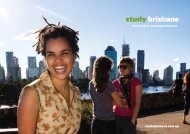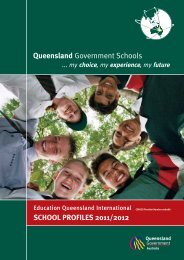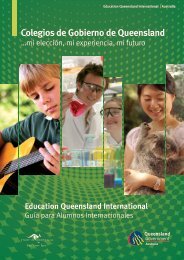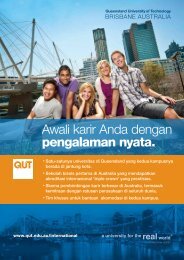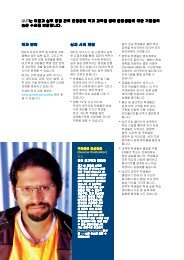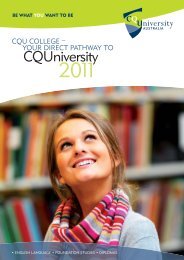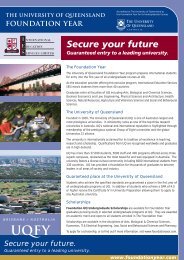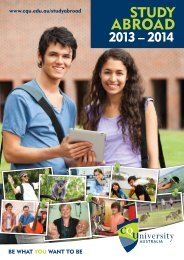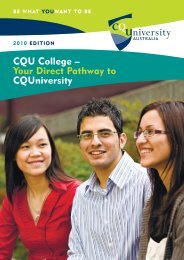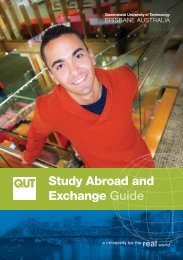UNDERgRADUATE PROSPECTUS - Study Brisbane
UNDERgRADUATE PROSPECTUS - Study Brisbane
UNDERgRADUATE PROSPECTUS - Study Brisbane
- No tags were found...
Create successful ePaper yourself
Turn your PDF publications into a flip-book with our unique Google optimized e-Paper software.
Agriculture, Animals, Food and Environment<br />
Career opportunities<br />
State and federal government departments;<br />
universities; private industry including tourism,<br />
industrial organisations, or commercial<br />
consultancies dealing with environmental<br />
planning and management; environmental<br />
tourism; and monitoring and impact assessment.<br />
If you perform well at honours level, you may<br />
choose a research-related career path by<br />
entering a postgraduate program.<br />
For graduates of the Bachelor of Environmental<br />
Management (Natural Systems and Wildlife):<br />
private or public sector in environmental<br />
management and compliance; land care;<br />
commercial consultancies dealing with<br />
environmental planning and management; mine<br />
rehabilitation; environmental tourism; and as park<br />
rangers, managers and environmental officers<br />
with local government.<br />
International contact details<br />
International Student Advisor<br />
Online: www.uq.edu.au/international/enquiry<br />
Phone: within Australia (free call): 1800 671 980<br />
Outside Australia: +61 3 8676 7004<br />
Bachelor of<br />
Food Technology<br />
Program code 2037<br />
Location St Lucia<br />
Commencement semester 1, 2<br />
Duration Four years full-time<br />
Delivery mode Internal<br />
Admission requirements Year 12 (or equivalent)<br />
English, Chemistry and Mathematics B (see page<br />
92)<br />
Honours Awarded based on the weighted<br />
percentage of specific courses in the program<br />
Program outline<br />
Food technology is the application of food science<br />
to selecting, preserving, processing, packaging,<br />
distributing, and using safe, nutritious, and wholesome<br />
food. Food scientists and technologists study the<br />
physical, microbiological, and chemical makeup<br />
of food. Depending on their specialisation, food<br />
technologists develop ways to process, preserve,<br />
package, or store food, according to industry and<br />
government specifications and regulations.<br />
Placement courses<br />
There is a 20-week (one semester) placement in the<br />
food industry in the third year, where you will gain a<br />
taste of working in a food company, and experience<br />
food technology in action. Students often gain their<br />
first job after graduation with the food company in<br />
which they spent their industry placement.<br />
Bachelor of<br />
Veterinary Science<br />
Program code 2036<br />
Location Gatton<br />
Commencement semester 1<br />
Duration Five years full-time<br />
Admission requirements Year 12 (or equivalent)<br />
English, Chemistry, Mathematics B, plus either<br />
Physics or Biology (see page 92)<br />
English language proficiency IELTS overall 7;<br />
writing 6; speaking 7<br />
Honours Awarded based on the weighted<br />
percentage of specific courses in the program<br />
Program outline<br />
Veterinary science is the application of medical,<br />
diagnostic, and therapeutic principles to companion,<br />
domestic, exotic, wildlife, and production animals.<br />
Veterinary science is vital to the study and<br />
protection of animal production practices, herd<br />
health and monitoring spread of disease. It requires<br />
scientific knowledge to be acquired and applied<br />
in multiple disciplines, and uses technical skills<br />
towards disease prevention in both domestic and<br />
wild animals.<br />
Human health is protected by veterinary<br />
scientists working closely with many medical<br />
professionals, and through careful monitoring<br />
of livestock health and unique training in<br />
epidemiology and emerging zoonotic diseases<br />
worldwide. Veterinarians help ensure the quality,<br />
quantity, and security of food supplies by working<br />
to maintain the health of livestock. Veterinary<br />
scientists are important in chemical, biological, and<br />
pharmacological research.<br />
Placement courses<br />
You must undertake eight weeks of vacation work<br />
(in your own time) by the end of your third year<br />
of study. In fourth–year, you will undertake eight<br />
weeks of clinical practical work. In final–year, you will<br />
undertake three weeks of specialist practice.<br />
Career opportunities<br />
Veterinary professionals in roles such as: urban<br />
and rural private practitioners in Australia and<br />
overseas; consultants on aspects of animal<br />
production and disease control; consultants<br />
with federal and state governments dealing with<br />
the control of animal disease and the efficiency<br />
of animal production; advisors to industry<br />
(especially pharmaceutical and biotechnology<br />
companies); and educators and/or researchers<br />
with universities and governments.<br />
International contact details<br />
International Student Advisor<br />
Online: www.uq.edu.au/international/enquiry<br />
Phone: within Australia (free call): 1800 671 980<br />
Outside Australia: +61 3 8676 7004<br />
Career opportunities<br />
The food industry is a fast paced and<br />
technologically advanced field, with a variety<br />
of employment opportunities. The sector is<br />
currently experiencing a skills shortage, meaning<br />
that graduates are often offered a position/s<br />
prior to graduation. Graduates from this program<br />
find employment throughout the supply chain,<br />
which includes areas such as quality assurance,<br />
technical sales, production management,<br />
process and product development, research and<br />
development, food microbiology, food standards,<br />
and food technology.<br />
International contact details<br />
International Student Advisor<br />
Online: www.uq.edu.au/international/enquiry<br />
Phone: within Australia (free call): 1800 671 980<br />
Outside Australia: +61 3 8676 7004<br />
Students with sheep at UQ Gatton<br />
UNDERGRADUATE <strong>PROSPECTUS</strong> FOR INTERNATIONAL STUDENTS 2012<br />
43



